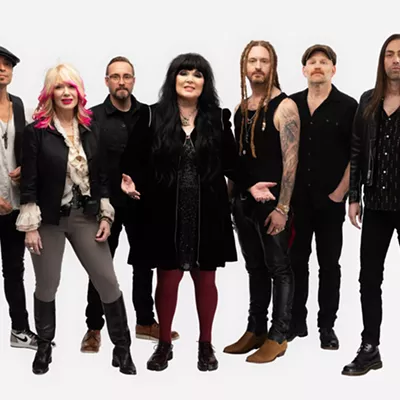In the 1960s, noted aircraft engineer Kelly Johnson coined terminology to keep designers from overcomplicating the systems they were creating for military aircraft. It's known as the KISS principle:
Keep It Simple Stupid
While Johnson was applying this delightful curt acronym to jet-building, it could've just as easily been applied to the garage rock movement that was starting up during the same era. The scrappy brand of rock wasn't as concerned with polished technical professionalism as it was stripping rock back to the basics to let all the angst and fury out in a barrage of fuzzy power chords and energetic vocal wails. The genre stumbles into haphazard sort of grace by letting simplicity be its driving force. It's a style that will never fully fizzle out — no matter how many folks say that rock is dying — because there's a continual flow of new young people wanting to pick up an instrument and shred with their pals without a crazy high barrier to entry.
John Barrett, the frontman of garage rock band Bass Drum of Death, was once one of those kids. He'd play one-man band shows with just his voice, a guitar and a bass drum (hence the name). The act started in Oxford, Mississippi, but Barrett eventually moved to New York City to try to be part of a more vibrant and active scene. And while Bass Drum of Death might now be 15 or so years into its musical journey and since expanded into a two-guitars-and-drums trio, Barrett's passion for garage rock's style still remains.
"I think it's just how simple and effective that can be, whether you're at a show or watching or coming up with stuff," Barrett says. "It's not rocket science. It's pretty much the same three chords that everybody's playing, but there's a million different ways to do it. So I think that's part of the fun for me — figuring out how to take something that's pretty simple and add your own flavor to it. It's always fun to keep pushing it."
Bass Drum of Death's latest attempt at pushing it comes in the form of its fifth LP Say I Won't, which arrived in January. The album's dozen tracks navigate the line between studio polish and the band's untethered live energy. The record vacillates from melodic rock, pump-your-fist-in-the-air sing-alongs ("Everybody's Gonna Be There" and "Find It") to darker blues riffing ("Head Change" and "Say I Won't"). BDoD exists in the same sonic phylum as acts like Ty Segall, Surf Curse and Osees. A song like "Say Your Prayers" even calls to mind a scrappier version of the Black Keys — which makes sense considering the Black Keys' drummer, Patrick Carney, produced Say I Won't.
"We kind of wanted to meet in the middle between like a big studio sound and kind of like how [our 2011 debut] record GB City sounded," says Barrett. "We wanted to bridge those two worlds together."
Prior to Say I Won't, part of Barrett's simplicity formula has been a literal D.I.Y. approach. He made the first two BDoD albums all by himself. Collaboration wasn't a going concern. But with Carney on board, he decided to loosen the reins and roll with others' ideas in order to reach a better final product.
"It was just little things. Allowing them to kind of sprinkle their own influence on it," Barrett says. "I had to learn to be less of a control freak. In the past, I would just be like, 'Well, I'm just gonna do it.' So that was a learning process for me, but I think it was a good one. And I think it definitely turned out way better doing it that way."
But his openness to musical collaboration isn't the only major change in Barrett's life. He also moved back home to Oxford, which turned out to be a creative blessing in disguise when everything shut down due to the pandemic.
"I headed home like right before the pandemic sort of hit super gnarly," he says "It was a good place to be over COVID, especially for like buckling down and getting some writing done."
While the constant hussle energy of New York City certainly gave a jolt to BDoD's system, it felt like the right time to leave for Barrett. It certainly helps that his girlfriend enrolled at law school at Oxford's Ole Miss University, but the difficulties of the Big Apple also wear on transplants as they age.
"I mean, some of that is just getting older and kind of wanting different things. As you get older and you get in different situations and figure out what it is that you want and what you don't want," Barrett says. "I had so much fun living in New York. But it's also just difficult in New York to make music and make noise at all, generally. Moving back to Oxford definitely lent itself to being able to make music more regularly."
The band members may change, the production process may change, the home base may change... but through it all, Bass Drum of Death keeps it simple. Which is anything but stupid. ♦
Bass Drum of Death, Have a Rad Day • Sun, Feb. 26 at 8 pm • $20-$23 • 21+ • Lucky You Lounge • 1801 W. Sunset Blvd. • luckyyoulounge.com • 509-474-0511






























